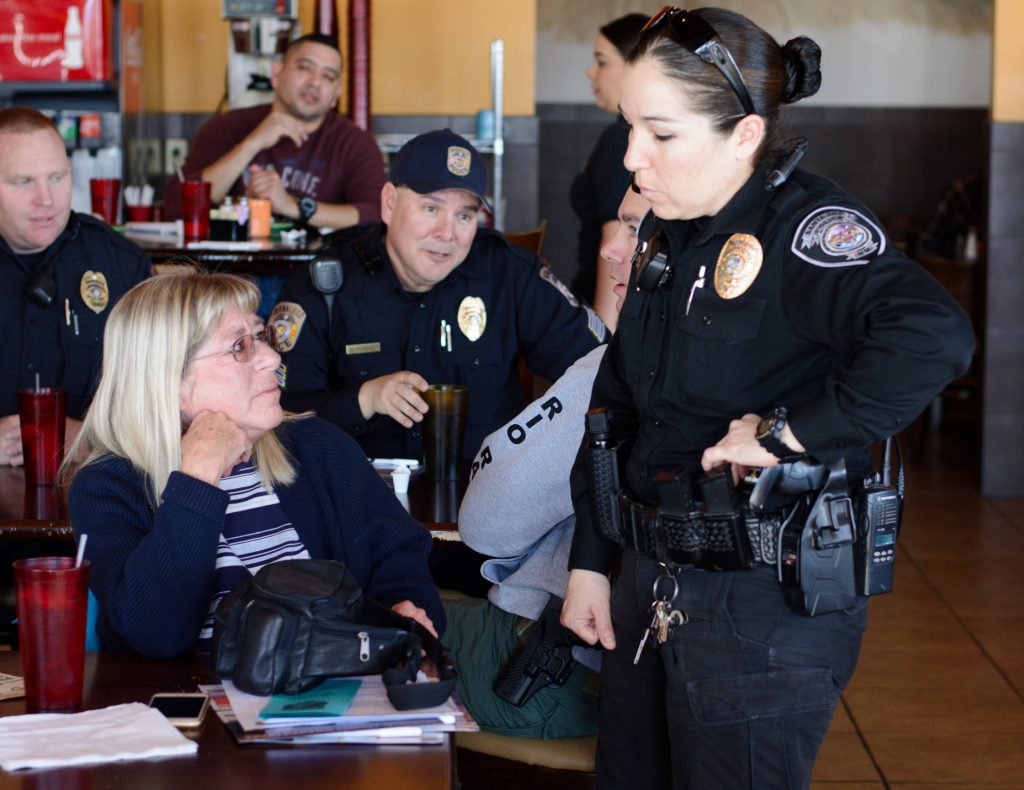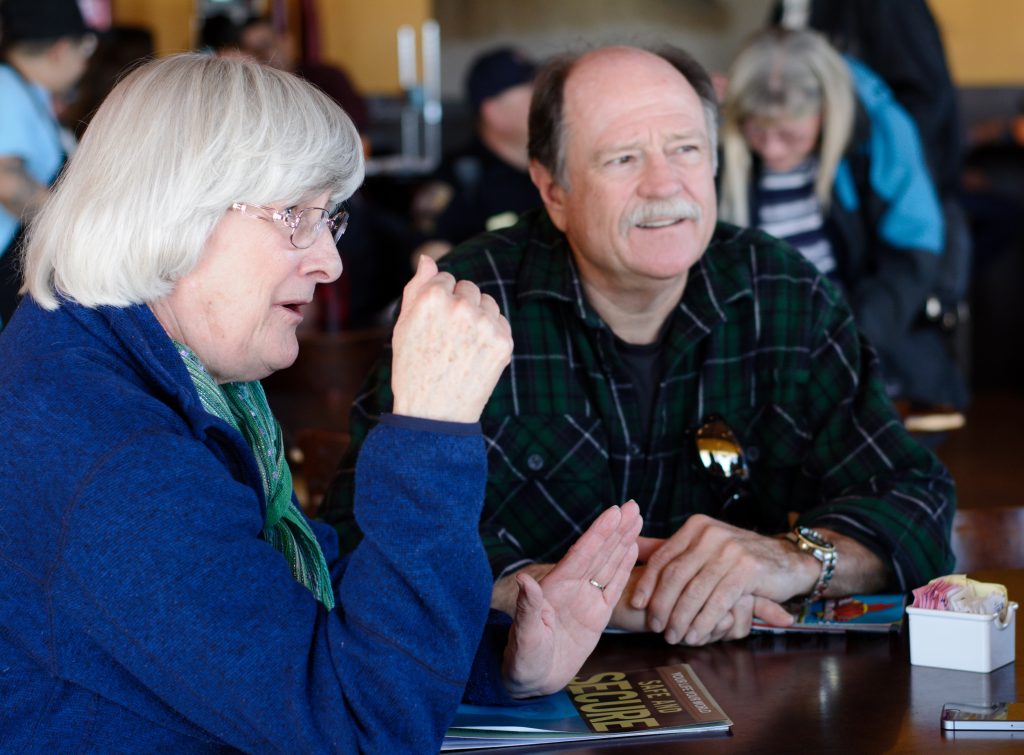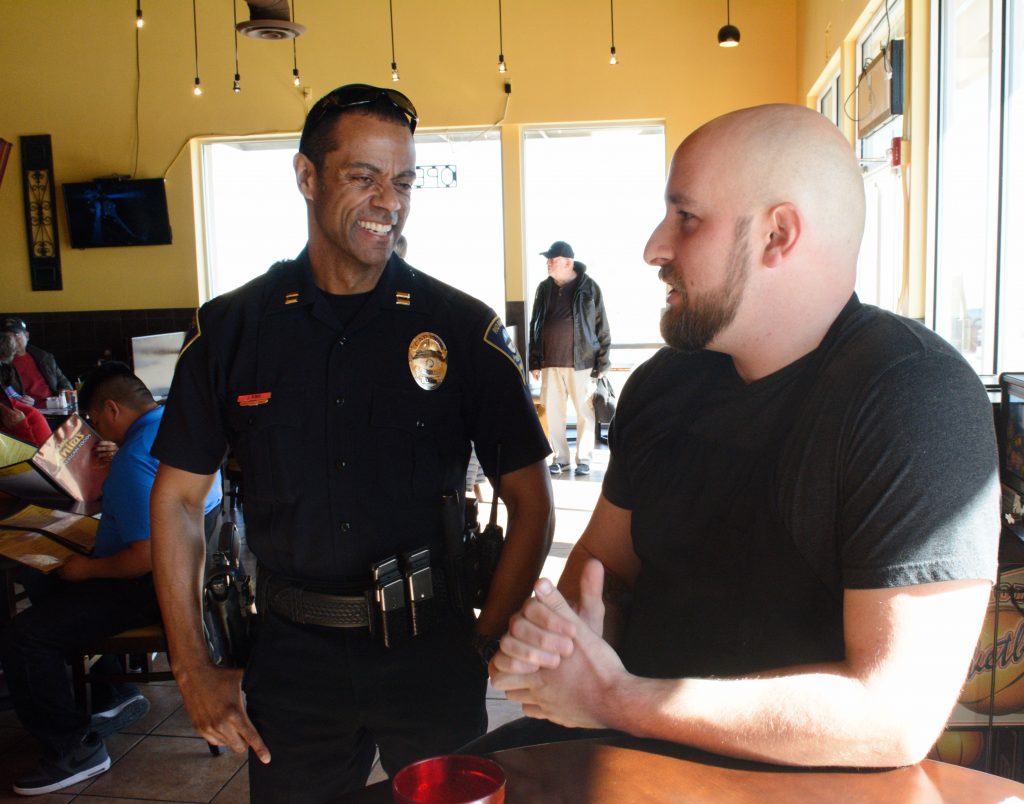Tish Tyler is no different than her neighbors in the Enchanted Hills neighborhood of Rio Rancho. She is concerned about crime.
“Our mailboxes have been broken into, several times,” Tyler said. “Reading the paper, I’ve noticed that it seems to be happening all over the place.”
Tyler’s audience was in a position to do something about it — the local police.

Tyler was among an estimated 100 people turning out for “Coffee with a Cop,” on Saturday, Jan. 28th at a Rio Rancho restaurant. Uniformed officers were there from the Rio Rancho Police Department, the Sandoval Co. Sheriff’s Office, the Santa Ana Pueblo Police Department, the Bernalillo County Sheriff’s Office (BCSO) and the U.S. Post Office Inspectors.
Lt. Ken Willey of the Rio Rancho Police says the event is a great way to bring the community together, and helps citizens learn to trust their cops.
“‘Coffee with a Cop’ helps to break the ice with a cop in a uniform,” Willey said. “It’s hard to approach someone in a uniform, because there’s already that ‘commanding presence’ barrier. We want to make sure that people know that that’s not always the truth–it’s just a uniform.”
Willey works in traffic enforcement. He says the event helps him do his job because it allows citizens to identify any problem intersections or areas they have encountered in the Rio Rancho area.
Couple Ron and Ralyn Stull, who also live in the Enchanted Hills area, said their primary concerns were credit card fraud (they say they’ve had multiple credit cards compromised while living in Rio Rancho)– but also echoed complaints over mailbox break-ins and vehicle thefts.

“When we first got here in 2012, we had a really, really nice landscaping trailer, with dual wheels and everything, and someone came in and broke all of the locks off of it and took it,” Ralyn said. “We also had a John Deere tractor, that was in the backyard, behind the gate. This had locks, which were broken too.”
Police said, the chance to recover it, was 3 percent, but the Stulls never heard anymore.
The open conversation allowed people like the Stulls to talk about their issues in person, rather than submitting a claim over the phone.
“It’s much easier to relate to someone as a human being when it’s face-to-face like this,” Willey said. “Five or ten years ago, if you had a problem with your police department you’d call in to dispatch, dispatch would send you to a sergeant, and then the sergeant would take the complaint. There’s no personality with that.”
Events similar to “Coffee with a Cop” have popped up across the country in an effort restoring trust between police departments and the citizens they serve. The event is part of the “community policing” movement — a reform effort that gained traction under the Obama administration.
The movement has been fueled as a solution to growing tension between citizens and the police, some resulting in riots and protests questioning police power and excessive use of force. Protests turned violent in cities such as Ferguson, Mo., Chicago, Ill. and even in Albuquerque, following the fatal police shooting of the mentally-ill, homeless camper, James Boyd in 2014.
The Albuquerque Police Department (APD) have their own version of “Coffee with a Cop.” It was introduced as part of a reform effort the city adopted after a critical report by the U.S. Department of Justice and an ensuing court-monitored consent agreement fixing policing problems. The APD version is called #TuesdayCopTalk. These conversations take place during the first Tuesday of every month on Twitter, allowing the community and police officers the opportunity to interact through live social media.

Little Anita’s Express provided a space for the event. Restaurant manager, Nathan Hopper, says he supports events such as “Coffee with a Cop” because it not only bring him business, but they show how much the cops really care about their community.
“We want people to know that they’re able to talk to police officers, and see that they’re not all bad guys,” Hopper said. “That’s what everybody’s persona on them is. I want people to be aware that they’re nice guys, and that they’re normal people just like us.”
Follow Brenna & Ricky on Twitter